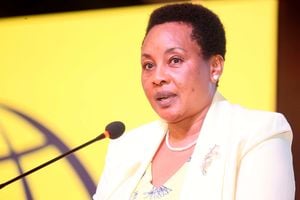Democracy in Kenya is more of an illusion

Kibwezi West Mutuse Mwengi tabling his impeachment motion against Deputy President Rigathi Gachagua at the National Assembly in Nairobi on October 8, 2024.
Democracy, hailed as the finest form of governance, promises fairness, participation and equality. But in Kenya, does it truly deliver, or has it devolved into an illusion?
The 2010 Constitution, with its lofty ideals, aimed to set a new standard for governance—one that is by and for the people. Yet, in practice, it often feels more like a political theatre where the public’s voice is drowned out by self-serving elites. Take, for instance, the impeachment of Deputy President Rigathi Gachagua.
Was this an exercise in accountability or just another case of political expediency? While our Constitution lays out a framework for checks and balances, Parliament often seems more interested in scoring points and settling scores than upholding the people’s will.
Plato, the Greek philosopher, had his reservations about democracy. He warned that it could easily become a system where unqualified leaders rise to power, driven by populism rather than merit. In Kenya, that fear has become all too real. Despite our Constitution’s best efforts to guard against such corruption, the reality often falls far short.
The annulment of the 2017 presidential election by the Supreme Court momentarily revived the faith in Kenya’s democracy. But this brief moment of hope has since been overshadowed by the same issues that plague the system: corruption, manipulation and an apparent disregard for the very principles democracy.
Political survival
Kenya’s Parliament, meant to represent the people’s will, often seems more concerned with political survival. Legal experts like Prof Yash Pal Ghai have critiqued Parliament for failing to effectively check the Executive. The speed with which Mr Gachagua’s impeachment was pursued raises questions: why such quick action for one issue, and not others that matter more—like unemployment or healthcare?
Majority rule, the cornerstone of democracy, can often become a weapon for the powerful. Just because a majority votes in favour of something doesn’t make it just or constitutional. As Prof Ghai reminds us, democracy is truly tested by how it protects minorities and upholds justice, even when the majority may disagree. But in a system where the majority is often manipulated, does that even matter?
Then there’s the issue of dynasties, which turn democracy into a cruel joke. In Kenya, the Kenyattas and Odingas have become household names in politics, like a never-ending sequel in a movie franchise no one asked for. This political monopoly limits real choices and perpetuates a system where power remains concentrated in the hands of a few families. If democracy is supposed to reflect the will of the people, why does it feel like we’re being asked to vote for the same old names, with little chance for new voices to emerge?
True democracy is not just about numbers, it’s about adherence to fairness, justice and the integrity of the Constitution. Until that happens, democracy in Kenya will remain a comforting ideal rather than the reality it promises to be.
Mr Ngome comments on political issues. [email protected].




